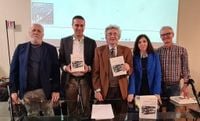On April 24, 2025, a significant event unfolded at the Tourist Infopoint, as Mario Anzani's book titled "Oltre il ponte - Il fascismo. La Resistenza. La Costituzione Repubblicana" was presented. This presentation was part of the program "Ottanta voglia di libertà," which aims to commemorate the anniversary of Italy's Liberation on April 25, 2025. The evening commenced with a moment of silence in memory of Pope Francis, setting a reflective tone for the gathering.
The event was moderated by Mauro Tosi and featured a poignant recitation of the poem "Oltre il ponte" by Italo Calvino, performed by Anzani's grandsons, Pablo and Dante. The poem was also accompanied by a musical rendition from the Modena City Ramblers, adding a layer of cultural depth to the evening.
Mario Anzani shared insights into his writing journey, revealing that he began crafting the book nearly ten years ago, with the most intense work occurring during the pandemic. "I didn’t write for myself but to leave something for my grandchildren, the new generations, and the city," Anzani explained, emphasizing the importance of preserving historical memory. He expressed concern over the ongoing attacks on the Constitution since the 1980s, highlighting the book's purpose as a modest contribution to ensuring that constitutional principles are upheld.
According to Sara Olivari, the principal of Liceo Rebora, the book is crafted with both reason and emotion, dedicated to the resisters of yesterday, today, and tomorrow. "We are in a historical moment where freedom and the idea of the common good are being disrupted by tyranny, corruption, and economic dominance," she stated. Olivari praised Anzani's analysis, which begins at the end of World War I and examines the connections between historical events and individuals, while also revitalizing the principles of the Constitution that embody the hopes of its founders.
Professor Matteo Gaifami from the Puecher Olivetti Institute described Anzani's work as a "wise reading of world experiences," analyzing historical events with a passionate approach that reveals an antifascism rooted in civil passion, standing in stark contrast to apathy. He emphasized the importance of recognizing the dangers of fascism, warning that the ideology could resurface in various forms.
Alfonso Airaghi from ANPI Rho echoed these sentiments, stating, "Today, the Constitution is under attack, as are the rights of workers and women. We witness assaults and glorifications of fascism, as well as the horrors of the Decima Mas. The loss of memory has three enemies: the weakness of remembrance, the tendency to forget, and time itself. It is relentless, which is why we must oppose it with antibodies that arise from schools, institutions, unions, and democratic forces." Airaghi highlighted that Anzani's book allows readers to immerse themselves in history and understand the evolution of fascism based on systemic violence.
Mayor Andrea Orlandi remarked on Anzani's character, noting that his sometimes sharp yet clear and determined writing reveals the reasons behind the rise of fascism. He expressed concern over contemporary attitudes that normalize terms like "deportation," calling for a political discourse that fosters future perspectives. Orlandi concluded that the book is a gift to the youth, encouraging discussion and free thought.
In a related event, on April 25, 2025, the Royal Academy of Jurisprudence and Legislation in Spain hosted a presentation honoring Professor Danilo Castellano, a prominent figure in contemporary legal and political philosophy. The meeting, presided over by Professor Miguel Ayuso from Pontificia Comillas University, gathered scholars and legal experts, including Ricardo Marques Dip, president of the International Union of Catholic Jurists.
Professor Ayuso opened the proceedings with an introduction that outlined the volume's intent and structure, emphasizing Castellano's consistent philosophical journey amidst current legal and political challenges. Following this, Professor Rudi Di Marco from the SSML/Istituto "san Domenico" in Rome provided a vibrant analysis of Castellano's thought, particularly focusing on the metaphysical dimension of his philosophical method.
Di Marco argued that Castellano's metaphysical realism is not merely a theoretical orientation but a hermeneutic key that allows for a deeper understanding of legal and political issues, transcending technical solutions to crises. He framed Castellano's philosophy as a return to classical thought, not out of nostalgia, but as a rediscovery of the eternal truths that underpin legal and political life.
Di Marco also critiqued the so-called "poetic philosophy" prevalent in modernity and postmodernity, which he claimed dissolves the ontological and normative content of philosophy into subjective constructs. He emphasized that both jurists and politicians must start from reality, comprehend its essence, and translate it into orderly action guided by classical principles.
As the event concluded, Di Marco expressed heartfelt gratitude on behalf of many scholars who resonate with Castellano's legacy, wishing him "ad multos annos!"
Meanwhile, a new volume titled "Brigata Maiella. Studi e ricerche," edited by Edoardo Puglielli, was announced for publication on the 80th anniversary of the Liberation. This book aims to restore historical dignity to the Brigata Maiella, gathering contributions from researchers and scholars coordinated by Puglielli.
The volume will be available starting May 2025 and seeks to provide a comprehensive overview of the Brigata Maiella's military operations alongside Allied forces, highlighting its unique character as a group of Abruzzese volunteers dedicated to liberating their lands. The book intends to rectify historical narratives that have marginalized the Brigata's contributions to the Resistance.
In summary, these events reflect a deep commitment to preserving historical memory and understanding the complexities of Italy's past. Whether through literature, philosophy, or historical analysis, the discussions surrounding these themes emphasize the importance of vigilance against tyranny and the need for a collective remembrance of the struggles for freedom and justice.





